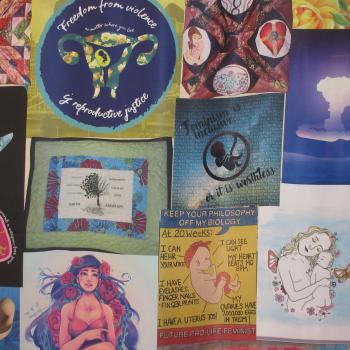I have a friend with whom I agree on most political issues. A moderate Democrat, he supports things like social welfare programs that promote equality and comprehensive immigration reform. One area where we firmly clash, however, is in our attitudes toward war. A historian of the ancient world, he believes that war has always been with us and always will be. I, meanwhile, am mostly persuaded by cognitive psychologist Steven Pinker’s arguments that, on the scale of all human history, humans have become less violent over time.
Fascinated with military history and strategy, my friend sometimes displays an attitude toward war that disturbs me. He takes war as a matter of course and sometimes glorifies it. Catholic teaching is ambiguous on war, with some theologians espousing pacifism and others endorsing just war theory. Nevertheless, I believe we should never lose sight of what war essentially is: a planned, concerted effort to kill large numbers of people, including noncombatants.
As you can imagine, over the last four months our differing attitudes have led to some lively discussions about Russia’s invasion of Ukraine. While there is much to say on that ongoing catastrophe, the subject of this article is an ideological battle raging here at home over one of our most divisive political issues: abortion. In the wake of the Dobbs v. Jackson Supreme Court decision, I watch some of my loved ones rejoice while others lament. As we approach the holiday that marks our establishment as a nation, it seems that our United States of America are growing ever more divided. At the risk of alienating loved ones on both sides of this extremely polarized issue, I dare to argue that neither side is in the right.
As a cradle Catholic, I grew up in a decidedly anti-abortion environment. My mother was an avid member of the parish Respect Life committee. At age ten, I carried a sign declaring “Abortion Kills Children” at a protest marking the twenty-year anniversary of Roe v.Wade. In a high school biology class, when assigned to do a research paper on bioethics, I investigated the various forms that abortion can take, horrified to learn of practices as gruesome as the biblical slaughter of innocents ordered by King Herod. I later found out that my teacher who assigned the project was the daughter of a rape victim. Encouraged to have an abortion, she instead had the child who grew up to be an inquisitive, curious science teacher whose passion for knowledge was infectious.
At age eighteen, when I left the all-Catholic world of my childhood to attend a secular liberal arts college, I encountered people of pro-choice views for the first time. They spoke of women’s rights and bodily autonomy. They spoke of hypocrisy, arguing that in fighting against not only abortion but also policies like paid family leave and social welfare, anti-abortion activists did not live up to their pro-life moniker. Some claimed that, in resisting not only abortion but contraception, the anti-abortion movement’s true aims lay not in saving unborn children, but in restricting sexual freedom in ways that disproportionately burden women – particularly women of color and women who live in poverty.
Initially, I was horrified by the pro-choice arguments. Sometimes I’d try to engage in debate; often I’d just stay quiet to keep the peace. Nevertheless, over time my views on this and other complex moral issues became more nuanced, as they so often do when I encounter people for whom they are lived experience rather than ideological principle. My firm antiwar stance was complicated when I attended the 2011 West Point graduation ceremony of my cousin, who then went on to fight in Afghanistan. My socialist-leaning economic attitudes have been complicated as I’ve talked with my father. A steelworker who did heavy manual labor for fifty years while investing his earnings judiciously, he deeply resents feeling like the fruits of his work are taken from him by force.
And, my firm anti-abortion stance has been challenged as I’ve met women who have told me their personal stories of having abortions. In no case was the decision made lightly; in all cases there were reasons why carrying, giving birth to, and raising a child seemed like too heavy of a burden to bear. In all cases there was emotional pain. And I do not forget that for the few women in my life who have told me their abortion stories, there are many others – undoubtedly family members, friends, and students – who have not. When one in five pregnancies in the US end in abortion, it is overwhelmingly probable that we all know someone touched by this experience.
Today, as this extremely polarized issue is adding more rips to an already frayed social fabric, I am saying something that few will be happy to hear. In her acclaimed TED talk “The Danger of a Single Story,” Nigerian writer Chimamanda Ngozi Adichie argues that many of our social problems come about when people believe only one single narrative about another person or group. “The problem with stereotypes is not that they are untrue, but they are incomplete,” she says. As I listen to the rhetoric on both sides of the abortion issue, I do hear more than one story…but they all seem incomplete.
After many years of hearing phrases such as “the Holocaust of the unborn” from anti-abortion activists, I find it impossible to understand how women with unwanted pregnancies – including women who have suffered abuse, trauma, and economic injustice – can fairly be compared to the Nazi architects of the Final Solution. Indeed, on the anti-abortion side, the rights of women are given no consideration. Meanwhile, on the pro-choice side, I encounter an absolute refusal to even consider the possibility that an unborn child might have human rights; the personhood of a fetus is denied a priori.
Women who have chosen to have abortions count among my loved ones. Hearing their stories, I have come to see abortion as very similar to warfare. Like war, it can be limited (somewhat), but ultimately, our laws cannot stop it from happening. Like war, it is often lamented and more often tolerated as a necessary evil that serves a justified purpose. For me, abortion is a tragic conflict on the scale of those in Israel/Palestine, Yemen, Afghanistan, Kashmir and Ukraine, played out at the most intimate level: between a mother and her unborn child. As in these large-scale political conflicts, there are many perspectives to consider. But in today’s political climate, neither the activists crusading to make abortion universally illegal nor those who would want complete, unrestricted access to the procedure seem capable of considering that there might be valid arguments on the other side – or, indeed, that there might be more than two sides.
According to the Pew Research Center, I am not alone in my conflicted attitudes about abortion. 19% of Americans believe it should be legal in all circumstances; 8% believe it should be illegal in all circumstances; most hold more nuanced views, taking into consideration how far the pregnancy has advanced, how much the life and health of the mother would be endangered, and what the effects would be for the child. Up to 25% want to recognize both bodily autonomy for a woman and an unborn child’s right to live. It is here, I believe, that the seeds of potential dialogue lie.
As Catholics, we are called to respect the Seamless Garment of life as Cardinal Joseph Bernardin so powerfully presented it to us and as our Catholic Social Teaching reminds us. We must be willing to call abortion what it is: the unjust taking of a human life. At the same time, we must place the situation of the unborn in a wider context. If we claim to be pro-life but explicitly or implicitly shame women for their sexual behavior, oppose policies aimed to support those living in poverty, discount the rights of immigrants, endorse capital punishment, or fail to care for the natural world, we are not living what we profess to believe. If we work for racial and economic justice, resist war, and fight for the rights of people with disabilities, but refuse to consider the interests of unborn children alongside those of their mothers, we are likewise not living what we believe.
As heated as this topic is, I believe that pro-life/pro-choice dialogue is possible and indeed necessary. This is one of those most challenging moral issues of our time, one where the truth might not be simple. We need to lower the temperature, suspend our judgment of others (particularly those whose experiences we do not know), and be open to hearing perspectives that might make us uncomfortable, always remembering that it is possible to have empathy for others and validate their feelings even as we disagree with their positions. I would challenge you to actively seek out someone who disagrees with you on this issue, to try at least to hear the arguments on the other side. I have not attended a pro-life march since high school, and I’ve never attended a pro-choice one. But in the wake of this decision, I am tempted to show up to both with a placard that states, “It’s More Complicated Than That.”

















